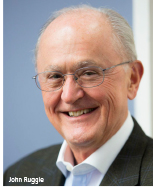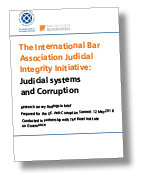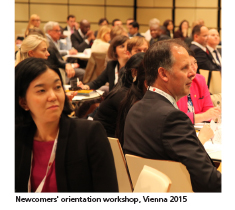Legal and business news from the IBA - Aug/Sept 2016
UK referendum on EU membership raises countless legal questions
Ruth Green
The result of the UK’s referendum on membership of the European Union on 23 June sent shockwaves through the financial markets.
While the country, the rest of Europe and indeed the world comes to terms with the result there are still many vexing legal questions that are challenging both lawyers and lawmakers.
‘The simple question that lawyers are already arguing about is that the referendum is not legally binding as parliament is sovereign and therefore must have the final say,’ says Professor Tony Travers of the London School of Economics. ‘Perhaps the most intriguing question is what counts as triggering Article 50,’ he says, referring to the formal legal process for EU withdrawal.
Some legal experts are concerned that the UK government could use its authority to trigger Article 50 under the royal prerogative – a collection of executive powers held by the Crown that relates to foreign affairs. Others argue that the Prime Minister, or her cabinet, can only issue Article 50 once they have received parliament’s consent.
Two legal challenges, including one being led by London law firm Mishcon de Reya on behalf of a group of business leaders, have already been brought to try and prevent the government from triggering Article 50 without first seeking parliamentary approval.
Jeff King, a constitutional and administrative law expert at University College London, says parliament’s involvement will be crucial to the negotiation process: ‘It’s an enormous body of people with talent and knowledge, who have largely agreed now that what’s done is done and that we can’t ignore this fact – this is crucial when
48 per cent of the people that voted wanted to remain in the EU.
‘It’s not just a formality because parliament can create a framework for how bargaining can happen, what approvals need to be made and perhaps even put forward the withdrawal agreement for a second referendum.’
Although King says the various claimants’ chances of success are unclear at this stage, he says it’s incumbent on the judges to resolve the dispute in a timely fashion: ‘We have to recognise that judges’ rulings on the royal prerogative in the area of foreign affairs have always been difficult to reach. Judges are often reluctant to interfere, particularly in relation to political disputes. That said, it does give judges a mandate to answer a question and they have a legal requirement to answer it.’
Turbulent times
As the legal debate continues on how Article 50 will be invoked, Peter Rees QC, a barrister at 39 Essex Chambers who chairs the IBA Corporate Counsel Forum and was legal director at Royal Dutch Shell from 2011–2014, says the intervening period poses particular challenges for businesses, and by association, their
in-house counsel. ‘Until there is a clearer understanding of what the UK is like as a place to do business outside the EU then businesses will be very wary of making investments or increasing investments in the UK […] in the short term there is very little certainty for businesses.’
One adverse effect of leaving the EU is the potential loss of the UK’s ‘passporting’ rights – a privilege that currently allows banks and other financial entities across the EU and the European Economic Area (EEA) to provide services to clients anywhere in the single market without incurring additional charges or requiring further authorisation.
The simple question that lawyers are already arguing about is that the referendum is not legally binding as parliament is sovereign
Professor Tony Travers
‘It would be an awful blow for the City if the passporting rights are lost,’ says Philip Wood, Special Global Counsel at Allen & Overy, who was a member of the IBA’s 2009 Task Force on the Financial Crisis. ‘Even though many banks have already set up subsidiaries within remaining EU countries so as to get passport rights anyway, there could be a lot of pressure on these foreign banks to move their senior people to a continental European location and that could be damaging.’
Some argue that the UK could retain the passporting privilege by striking a deal like Norway, which is outside of the EU but part of the EEA. However, Dirk Bliesener, partner at Hengeler Mueller in Frankfurt and European Liaison Officer for the IBA Banking Law Committee, says the UK’s task of negotiating the right deal involves many issues aside from passporting: ‘One part of the freedoms that exists in the EU is the freedom to supply goods and the abolition of customs duties and tariffs. The UK government and the EU could conclude a satisfactory agreement in this regard, but this is just one type of freedom. There’s also the freedom of movement as well as the freedom to provide services and so on, so these all need to be discussed.’
A number of banks, including US investment bank JPMorgan Chase, are already exploring options to relocate staff and restructure operations from London after the UK leaves the EU. Despite the uncertainty ahead, the proposed $27bn merger between the London Stock Exchange Group (LSEG) and Deutsche Börse is still expected to be completed by early 2017.
The exchanges, which hope to save around €450m by overlapping back-office functions and slashing more than 1,000 jobs, have said the referendum result won’t derail their plans to create the world’s largest exchange by revenue to challenge rivals in the US and Asia. However, Bliesener questions the rationale behind the deal: ‘There is still a certain logic in the merger, in view of globalisation and scale, but from the corporate governance point of view it’s hard to imagine the headquarters being located outside of the EU given that one of the benefits of the merger is the umbrella of a harmonised EU regulatory framework. It’s logical to have all of it in the EU.’
Despite some people’s reservations about London’s future status as a financial centre, Rees believes the city will remain a go-to jurisdiction for financial and legal services and dispute resolution. ‘London will remain a key financial and legal centre due to the favourable time zone and English law will continue to be viewed as a good, neutral law that people will write into their contracts,’ he says. ‘In some respects we need to look at how London has grown to become a strong legal and financial centre. I don’t think that’s necessarily because it’s been part of the EU.’
LPD Council member nominations for 2017–2020
After reviewing the nominations submitted for positions on the LPD Council, the Legal Practice Division (LPD) Nominations Committee has unanimously agreed to recommend nine candidates for election at the upcoming LPD General Meeting. This will take place on Thursday 22 September at the IBA Annual Conference in Washington, DC. The LPD Council positions run from 1 January 2017 to 31 December 2020.
The full list of those recommended, including the nominee’s firm, country and IBA section, committee or forum is as follows:
Sunil Abraham Cecil Abraham & Partners, Kuala Lumpur, Malaysia (Asia Pacific Regional Forum)
Patricia Hoet-Limbourg Hoet Pelaez Castillo & Duque, Caracas, Venezuela (Intellectual Property and Entertainment Law)
Sadiq JafarHadef & Partners, Dubai (Arab Regional Forum)
Neil Kirby Werksmans Attorneys, Johannesbourg, South Africa (Corporate Social Responsibility)
Pascale Lagesse Bredin Prat, Paris, France (Global Employment Institute)
Tim PowersHaynes & Boone, Texas (IBA Foundation and Advisory Member to IBA Constitution)
Ignacio Randle Estudio Randle, Buenos Aires, Argentina (Mining Law)
Eduardo Sanguinetti Sanguinetti & Asociados, Montevideo, Uruguay (IBA Regional Fora Coordination Committee)
Oliver Triebold Schellenberg Wittmer, Zurich (Corporate and M&A Law)
Ground-breaking Practical Guide on Business and Human Rights issued
 On 28 May 2016, the IBA Council voted to adopt the IBA Practical Guide on Business and Human Rights for Business Lawyers. In the context of growing demands on businesses to operate responsibly, the UN developed Guiding Principles on Business and Human Rights (UNGPs), authored by former Special Representative of the UN Secretary-General, Professor John Ruggie. The Practical Guideaims to facilitate implementation of the UNGPs and help businesses meet their responsibilities.
On 28 May 2016, the IBA Council voted to adopt the IBA Practical Guide on Business and Human Rights for Business Lawyers. In the context of growing demands on businesses to operate responsibly, the UN developed Guiding Principles on Business and Human Rights (UNGPs), authored by former Special Representative of the UN Secretary-General, Professor John Ruggie. The Practical Guideaims to facilitate implementation of the UNGPs and help businesses meet their responsibilities.
The Practical Guideresponds to growing recognition that the management of risks, including legal risks, means that lawyers need to take human rights into account in their advice and services. The Practical Guidesets out in detail:
-
the core content of the UNGPs based on its framework of three core pillars:
-
the state duty to protect human rights;
-
the corporate responsibility to respect human rights; and
-
the role of both states and companies to enable greater access to effective remedy, judicial and non-judicial, for victims of business-related abuses.
-
the relevance of the UNGPs to the advice provided to clients by individual lawyers subject to their unique professional standards and rules (whether they are in-house or external counsel acting in their individual capacity or as members of a law firm); and
-
the UNGPs’ potential implications for law firms as business entities with a responsibility also to respect human rights.
IBA President David W Rivkin commented: ‘The IBA’s adoption of the Practical Guideenables lawyers around the world to understand how best they can serve their clients in this new era and meet the responsibilities of their own firms themselves. Through this latest initiative the IBA underlines its continuous commitment to full engagement with the global legal profession, meeting the challenge of a changing world with heightened conscience while safeguarding the integrity of the profession. It is our intention to disseminate the Practical Guideas widely as possible through the Association’s vast international network.’
As a service to lawyers everywhere the guide is available to download from the IBA website free of charge at tinyurl.com/PracticalGuideIBA.
Timely Washington session on the EU post Brexit
 The series of discussions on ‘The Future of Europe’, which started in Vienna last year, will continue at the Annual Conference in Washington, DC. The debate takes on an even greater importance following the UK’s decision to leave the European Union. While the shock of the first few weeks has stabilised, the implications not only for Europe but also for economic order beyond its borders have yet to be fully assessed.
The series of discussions on ‘The Future of Europe’, which started in Vienna last year, will continue at the Annual Conference in Washington, DC. The debate takes on an even greater importance following the UK’s decision to leave the European Union. While the shock of the first few weeks has stabilised, the implications not only for Europe but also for economic order beyond its borders have yet to be fully assessed.
At 10:45 on the Tuesday of conference week, join the European Regional Forum and the Regional Fora Coordination Committee for this exciting discussion entitled ‘Brexit or bust? Better together or the end of Europe as we know it?’ Both ‘Leave’ and ‘Remain’ campaigners will take to the stage in Washington to discuss the outcome of the UK’s vote and its implications for trade, the economy, political costs and, of course, the legal market, as well as possible effects on worldwide enterprises operating in Europe.
Diversity in law firms: slow progress
Diana Bentley
Achieving diversity is one of the most challenging management issues law firms now confront. For over a decade, firms have been seeking to raise levels of women, ethnic and other minority groups within their ranks and especially within their higher echelons. Yet, despite their considerable efforts, progress is proving to be frustratingly slow.
‘We’ve had years of initiatives to improve diversity in firms and to some extent they’ve been successful, but they’ve not had the full impact they should have had and this is a major concern,’ says Tony Hyams-Parish, a partner at English firm Rawlison Butler and Co-Chair of the IBA Discrimination and Equality Law Committee.
While what amounts to discrimination in different countries varies, firms are confronting the same issues wherever they are. ‘There remains widespread inequality between men and women and people from different ethnic and social groups at the top of the profession across many jurisdictions,’ says Hyams-Parish.
The statistics speak for themselves. The Law Society of England and Wales’ Diversity Profile for the Profession for 2015 reveals that 75.1 per cent of practising solicitors are white European, 13.9 per cent are from black, Asian and minority ethnic groups and 2.5 per cent are lesbian, gay or bisexual. While 51.2 per cent of practitioners were male and 48.8 per cent female, 71.2 per cent of all partners were men. In America, the ABA reports that 88 per cent of lawyers are white. Like Hyams-Parish, ABA President Paulette Brown says the profession’s diversity profile is disappointing. ‘We’re behind the other professions on this. People of colour make up 7 per cent of partners in American firms. We want to be better than that.’
One explanation is that the profession’s focus on diversity is relatively recent. ‘Industry was ahead of us on this. In the profession in England and Wales, the attention really started with our Legal Services Act of 2007,’ says Hyams-Parish. ‘Our regulations now require firms to ensure that all their lawyers receive equal opportunities training and provide annual reports on diversity.’
The business drivers for embracing diversity are now also well acknowledged by lawyers. ‘Clients have really focused on diversity and expect their legal advisers to do the same,’ says Brown.
We’ve had years of initiatives to improve diversity in firms and to some extent they’ve been successful, but they’ve not had the full impact they should have had
Tony Hyams-Parish
Co-Chair, IBA Discrimination and Equality Law Committee
Firms say large corporations expect pitching teams to be more diverse and for firms to demonstrate their diversity credentials. With younger lawyers having different expectations about matters like equality, diversity programmes are also seen as central to retaining talent.
‘For me this is the biggest pressure for change (aside from the fact that it’s simply the right thing to do),’ says IBA President and Debevoise & Plimpton partner David W Rivkin. ‘The competition for the most able young lawyers is fiercer than ever. Any firm recruiting from a narrow sub-set of society will be missing out on lawyers with huge potential. There’s also the issue of maintaining effective leadership. Unless we achieve greater diversity among those leading the profession, it risks becoming out of touch with the wider world.’
As scrutiny of their diversity profiles has increased, many firms have invested considerable resources in diversity and have adopted a raft of programmes to facilitate change.
Initially, many aimed at gender diversity as the numbers of women and men entering the profession being equal, but relatively few women were gaining partnerships and, in particular, equity partnerships. Social background too has been a subject of attention while the focus on ethnic groups and LGBT lawyers has been more recent.
Training in equality and inclusion and in direct and implicit bias has become commonplace and recruitment processes shaped to address bias issues. Programmes aimed at women have included mentoring schemes and more flexible working arrangements to encourage working women lawyers to continue their careers.
Firms are addressing social diversity by reaching out into universities and schools to encourage youngsters from diverse backgrounds to consider a legal career. Large firms now have dedicated diversity managers and some have announced aspirational targets for women partners.
Firms say that now some progress is being made. Charandeep Kaur, Vice-Chair of the IBA Women Lawyers’ Interest Group, and a partner of Indian firm Trilegal, says that between 10–15 per cent of partners in Indian firms are now women and with the active encouragement of women lawyers to continue their careers, ‘I’d expect to see a lot more within the next 5–10 years.’
At Hogan Lovells, 23 per cent of the firm’s partners globally are women –up from 19 per cent in 2010. Baker & McKenzie reports that women now make up 25.3 per cent of its partners and 40 per cent of its most recent promotions are women. DLA Piper has 20 per cent women partners globally. At Debevoise & Plimpton, 40 per cent of new partners in the last eight years have been women, which Rivkin links not just to successful diversity programmes but strong women role models in the firm. ‘Female partners have long led practices like litigation, private equity and investment management,’ he says.
Whatever their level, however, diversity profiles aren’t altering at the expected rate and firms are therefore adopting more targeted approaches and initiating new projects to prompt greater change. Some are aiming to secure higher levels of various groups at the intern and trainee recruitment stage.
Brown notes that firms are now using sponsorship as well as mentoring programmes to help champion women and others. ‘A mentor helps with advice, but a sponsor actively champions a person’s financial cause which can really help make a difference,’ she says.
IBA releases study on corruption and judicial systems
 The IBA Legal Policy and Research Unit (LPRU), in partnership with the Basel Institute on Governance, has published The IBA Judicial Integrity Initiative: Judicial Systems and Corruption. The report has been created using the results of a global survey that involved 1,577 legal professionals from 120 countries, in-country consultations and additional research.
The IBA Legal Policy and Research Unit (LPRU), in partnership with the Basel Institute on Governance, has published The IBA Judicial Integrity Initiative: Judicial Systems and Corruption. The report has been created using the results of a global survey that involved 1,577 legal professionals from 120 countries, in-country consultations and additional research.
The report identifies the patterns underlying corrupt behaviour in the judiciary, the types of corruption that affect judicial systems and the roles played by the various professionals operating within them. In particular, it focuses on concerns about bribery, undue influence on judicial decisions, and the impact that these problems have on respect for the judiciary.
The report has attracted considerable attention. IBA President, David W Rivkin, and the Chairman of the Basel Institute on Governance, Professor Mark Pieth, presented an analysis of the report on 15 June 2016 at the IBA/OECD Anti-Bribery Conference in Paris.
The Director of the IBA’s LPRU, Jane Ellis, provided an overview of the report at an event entitled ‘Who Judges the Judges? Accountability for Judicial Corruption and Judicial Complicity’, held at the UN in Geneva during the Human Rights Council session on 14 June 2016. Other panel members were: Monica Pinto, Special Rapporteur on the Independence of Judges and Lawyers; Thulani Maseko, a lawyer from Swaziland who was imprisoned by judges for speaking publicly about judicial misconduct; and Matt Pollard, Centre for the Independence of Judges and Lawyers, International Commission of Jurists (ICJ). The IBA and the ICJ jointly conducted the event, during which the ICJ launched its new Practitioners’ Guide No 13: Judicial Accountability.
The launch of this report completes the first phase of the IBA Judicial Integrity Initiative. The Initiative will now focus on practical actions that may have an impact in reducing judicial corruption where it occurs. These include compilations of best practices for prosecutors and for bar associations; a potential system to certify judicial systems as having procedures designed to prevent corruption; a model compact agreement that would contain an anti-corruption declaration signed in individual countries by the bar association, judges, lawyers, prosecutors and court personnel; a study of national laws regarding judicial corruption; and, consideration of asset recovery mechanisms.
Making the most of the Annual Conference: newcomers’ orientation workshop
 If you’re new to the IBA or this will be the first year you attend the Annual Conference, then make sure to go along to the orientation workshop in Washington, DC. This lively
If you’re new to the IBA or this will be the first year you attend the Annual Conference, then make sure to go along to the orientation workshop in Washington, DC. This lively
two-hour introduction to the IBA and its Annual Conference is a great way to find out more and will help you to get the most out of the week. The workshop takes place at 1430 on the first day of the Annual Conference, Sunday 18 September.
For more details about the workshop, see tinyurl.com/IBAWashington2016.
Christine Lagarde announced as keynote speaker
 The IBA is pleased to announce that Christine Lagarde, Managing Director of the International Monetary Fund (IMF), will be the keynote speaker at the opening ceremony of this year’s IBA Annual Conference.
The IBA is pleased to announce that Christine Lagarde, Managing Director of the International Monetary Fund (IMF), will be the keynote speaker at the opening ceremony of this year’s IBA Annual Conference.
Further high-profile speakers confirmed for the Annual Conference include Michael Froman, President Obama’s principal advisor on international trade and investment issues. Froman will give Tuesday morning’s keynote address. Other newly confirmed speakers include: Arlene Foster, First Minister of Northern Ireland who will take part in Wednesday’s ‘Conversation with…’; and Justice Anthony M Kennedy, Senior Associate Justice, US Supreme Court who will speak at Friday’s Rule of Law Symposium.
Final registration deadline – Tuesday 6 September
The last opportunity to register for the 2016 Annual Conference, or to make any alterations to your existing registration ahead of the event itself, is Tuesday 6 September.
For more information and to view the full programme of over 200 working sessions and the extensive social events, visit the IBA Washington, DC, 2016 Annual Conference website at
tinyurl.com/IBAWashington2016.